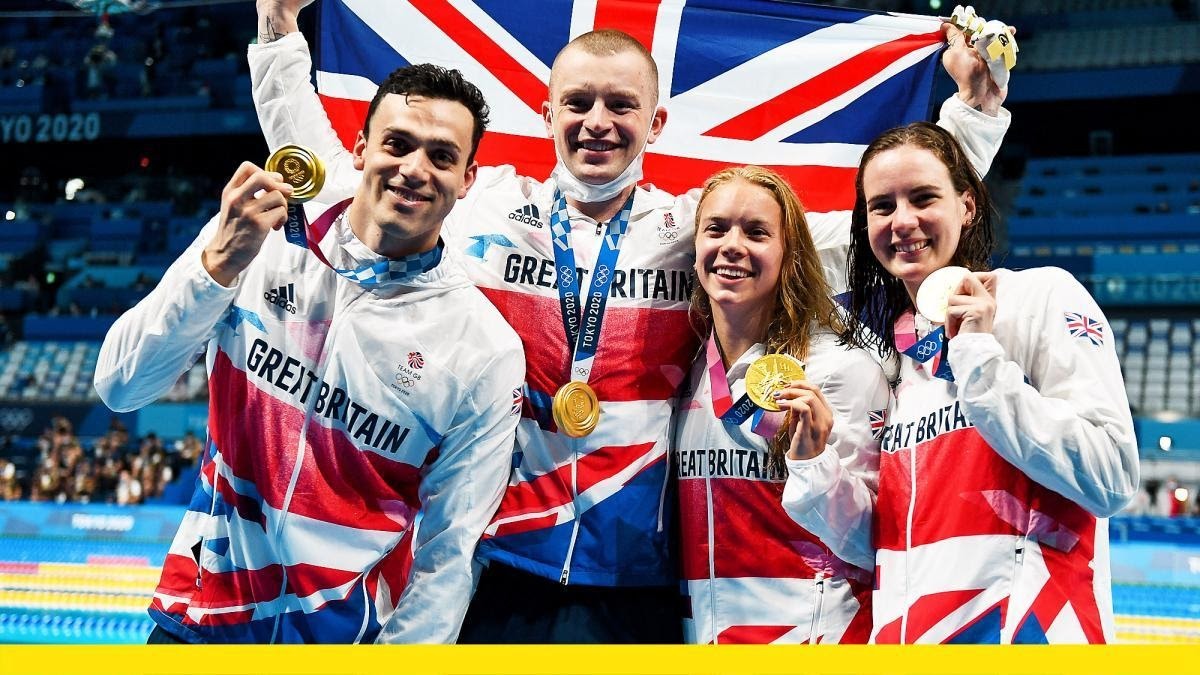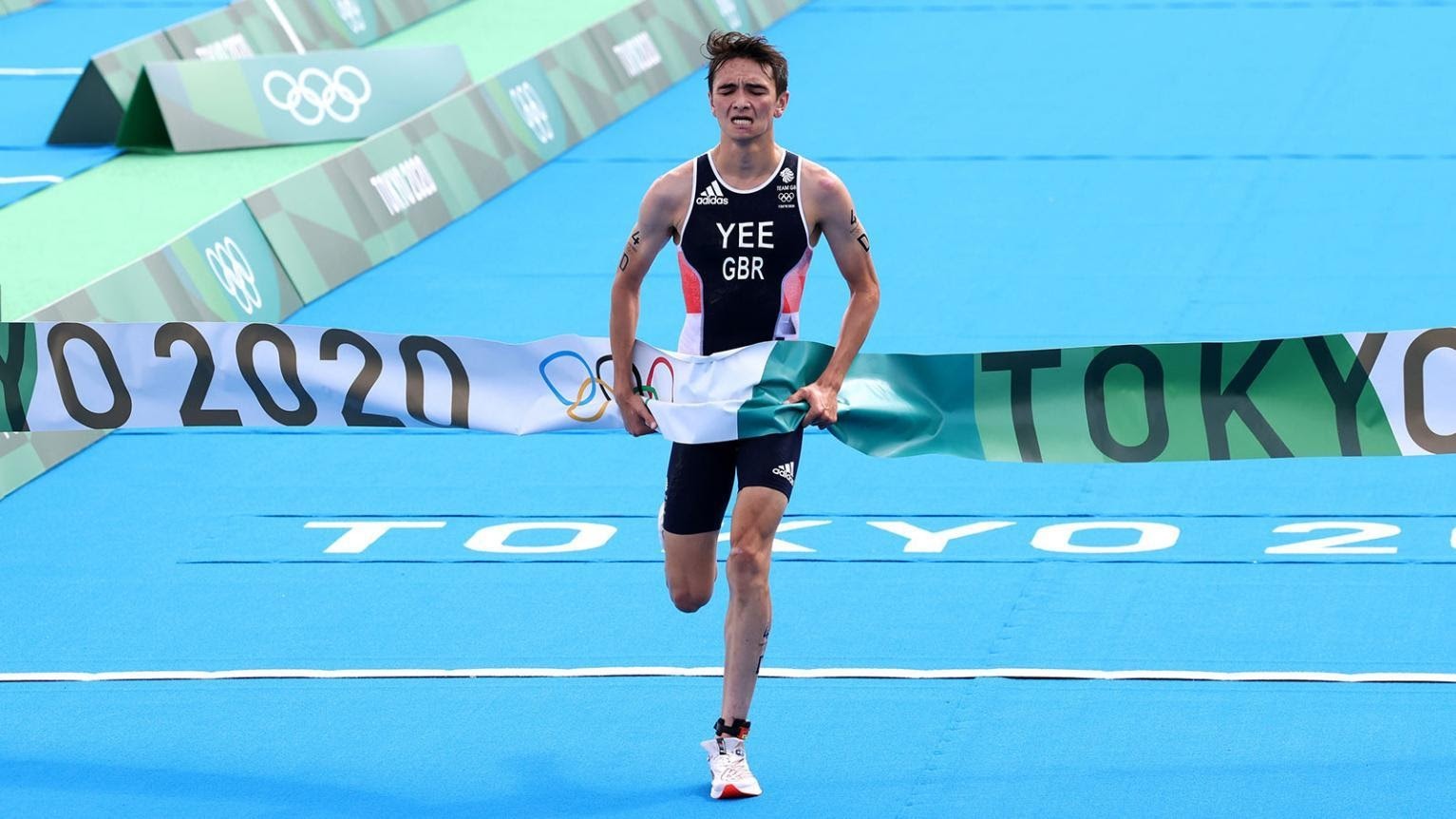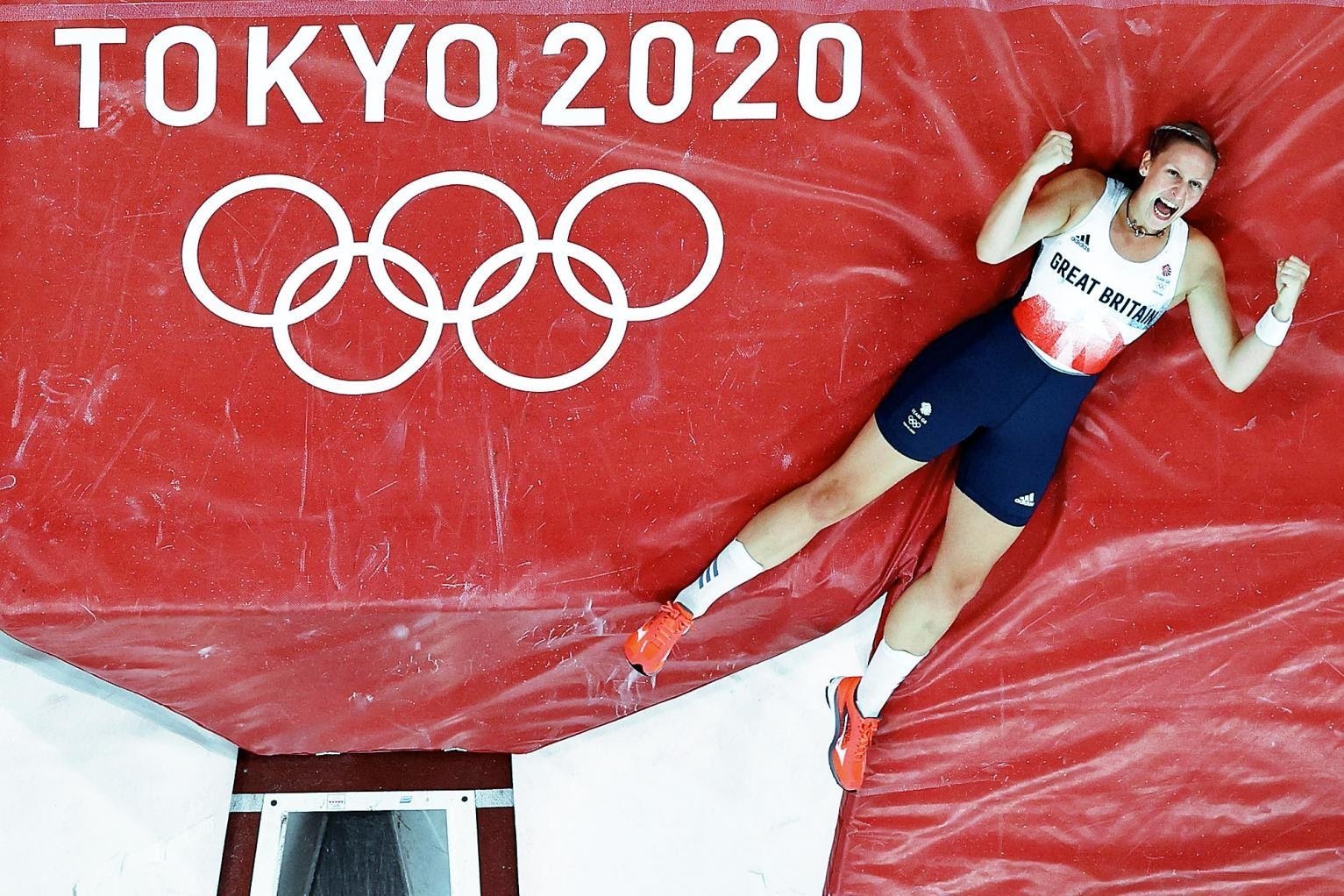How Loughborough University became an Olympic medal factory
If Loughborough University were a country it would have ranked in the top 25 in the medals table at each of the past two summer Olympic Games. Senay Boztas finds out what puts its athletes on the podium

James Guy, left, and Anna Hopkin, right, who both train at Loughborough, with Adam Peaty and Kathleen Dawson after winning gold in the inaugural mixed 4 x 100m medley relay at the Tokyo Olympics
MARC ASPLAND / TIMES NEWSPAPERS LTD
A young woman with big hair and an irrepressible smile greets students arriving for a workout at the Powerbase Gym at Loughborough University. Only afterwards — perhaps when they pass a giant picture of the sprinter Beth Dobbin on the wall — do they realise that this sometime receptionist and former Loughborough student is also a Team GB Olympian and Scottish record-holder for the 200m.
Dobbin is just one example of the university’s success in supporting elite athletes. With 14 medals, including three golds, if Loughborough University were a country it would have outperformed Sweden, Switzerland and Belgium at the Tokyo 2020 Olympics. And there were further medals in the Paralympics, with six golds, six silvers and nine bronzes. Dobbin was part of a stellar team of current and past students, plus those who trained at the university’s standout sports facilities, which included the swimmer Adam Peaty, who won two gold medals in the men’s 100m breastroke and the mixed 4 x 100m medley relay, and the triathlete Alex Yee, who won gold and silver in the individual and mixed relay. Dobbin, 27, came fifth in the women’s 200m semi-final. It was the experience of her life.
“The Olympics were just phenomenal,” she says. “In sport it just takes one small step or one mistake and you’ve gone from your dreams happening [to not]. If I had tested positive for Covid, I would have been finished too. I’m just pinching myself that I’ve done it against all the odds.”

Loughborough-based triathlete Alex Yee won gold and silver in the individual and mixed relay
LEON NEAL / GETTY IAMGES
Dobbin came to Loughborough as a psychology student and national 200m runner at the age of 18. Training with Leon Baptiste, who won gold at the Commonwealth Games in 2010, she took whatever work she could in Loughborough, easing off only in the Olympic year. She’s likely to be back at the gym reception desk on her days off training next season.
“A lot of students move here at 18 and just don’t leave: it’s called the Loughborough bubble for a reason,” she says. “Once you move here, it’s almost Disneyland for athletes with the support and amazing facilities, so you don’t want to leave.”
Loughborough is our Sports University of the Year for a third time due to its unparalleled elite success, the best sports facilities in the country (the best in one square mile in the world, it claims), and an atmosphere that welcomes and supports not only sportspeople aiming for international excellence, but also students who just want to keep fit.
In the past 15 years, the university has invested £60 million in sporting facilities on its 440-acre campus on the edge of the Leicestershire market town. It’s a long list that includes two world-class gyms, a High Performance Athletics Centre, the Paula Radcliffe Athletics Track, the National Cricket Performance Centre, its Netball Centre hosting England Netball, and a huge range of pitches — plus the £6 million pool where Peaty trains (which is also a British Swimming National Centre and British Triathlon Performance Centre). All this is backed up by technical facilities such as a human performance laboratory, technical analysis suite, nutritional analysis room and sports medicine service.
John Steele, executive director of sport at Loughborough, points out that the success in the pool, track and field reflects a belief in the benefits of sport, and serious academic expertise. “Medal tables can be one-dimensional, but what sits behind them is pretty amazing, especially in the couple of years we’ve had,” he says.
“A lot of people see the high-profile bit of Loughborough as what we’re mainly about, but there’s far more to us. We really do cover the whole spectrum and encourage people to have a relationship with sport, whether that’s a student playing a sport for the first time [or] being the home for Adam Peaty and providing all the support he needs to go to the Olympics and win gold medals.”
The university leads the QS World University Rankings 2021 for sports-related subjects and regularly tops the Good University Guide subject table for sports science. Its best results in the Research Excellence Framework in 2014 were found in sport and exercise sciences. “We join up research and innovation,” says Steele. “We have world-leading academic research in physiology, psychology, sports technology and all of these feed into the athlete programmes, ensuring our athletes get the best advice and chance of fulfilling their potential. It’s a raft of things we bring together in order to be a one-stop shop in terms of high-performance sport.”
Loughborough’s academics are working on issues of the moment such as the danger of concussion and head trauma in sports like rugby and football, and how equipment changes might help to mitigate it. The Sports Technology Institute has helped the International Cricket Council improve cricket helmet testing, with a view to reducing neck and facial injuries, and worked on the World Cup ball for FIFA, innovating to improve consistency and enhance the grip between ball and boot. Its innovations have been used in a number of World Cup tournaments.

Loughborough student Holly Bradshaw secured Britain’s first Olympic pole vault medal
REUTERS
Few remember the university’s long tradition of sporting excellence as well as its chancellor, Sebastian Coe, who graduated from Loughborough with a BSc in economics and social history in 1979.
“I arrived at Loughborough in 1976 and it was a university and a teacher training college that specialised successfully in physical education,” Lord Coe recalls. Their amalgamation in 1977 continued its development into one of the country’s leading institutions with a reputation for excellence in teaching and research and strong links with business and industry, as well as unrivalled sporting achievement. “If you look at the history of physical education in the UK since the Twenties and Thirties, it has really been a Loughborough story,” says Coe. “It’s not just training of elite competitors but it really spawned a generation of academics in sports science and physiology.”
The university was already out in front for sport when Coe arrived and students used to joke that it was harder to get on to the student team than the national one. Now, says the man who went on to win the 1,500m Olympic title twice, there is even more effort put in to helping students balance their desires for academic and sporting excellence. “If you go back 30 years, some academics would say if you’re wanting to pursue a high-quality career in sport, this is not the course for you,” he says.
“Now our attitude is very clearly: it’s right and proper to promote both. So we will often extend a course in order to avoid, for instance, an athlete having to do their finals in an Olympic year. We are very much more flexible.”
Coe sees the “tentacles” of Loughborough reaching throughout elite sports administration too: he was chairman of the London 2012 Olympics organising committee, while Baroness Campbell once led UK Sport, Liz Nicholl was its chief executive and Sir Clive Woodward coached the England rugby union team to World Cup victory in 2003 and served as director of sport at the British Olympic Association in the run-up to the London Games. Loughborough alumni, one and all.
Arriving in Tokyo before the Olympics, Coe adds, he was met at the airport by “a very nice delegation”. “The head of the delegation, the first thing he did was to unbutton his coat to reveal a Loughborough University tie, because he had been a postgraduate student there. We get around . . . I often describe Loughborough University as a 60-year-old overnight sensation.”
In a year when mental health in sport has been in the spotlight, Dobbin believes that the university’s network of success and support is key to its enduring appeal. “Whenever I race at Loughborough, so many people come out to support you and check you’re OK,” she says. “They are so proud of their athletes. Obviously, the facilities [are excellent], that goes without saying, but less obvious is the support: it’s a tight-knit family.”